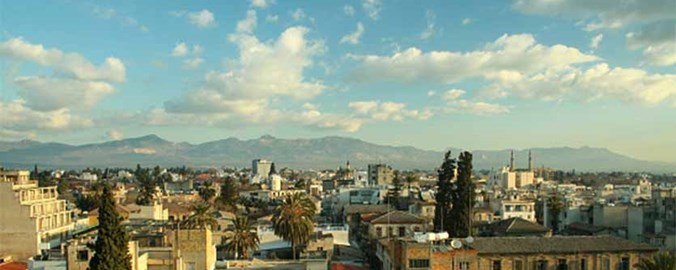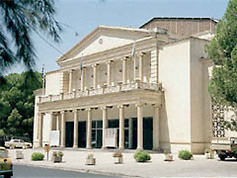
Property in Nicosia
 Services are sophisticated and professional and the city hosts regular trade fairs and exhibitions. As the administrative center and seat of Government, the city is dotted with various ministries and government buildings.
Services are sophisticated and professional and the city hosts regular trade fairs and exhibitions. As the administrative center and seat of Government, the city is dotted with various ministries and government buildings.
In Cyprus, and especially Nicosia, there is a vast amount of property investment and new construction taking place with demand currently outstripping supply. Boosted by the inclusion into the EU and an unprecedented amount of foreign and local investment, Nicosia attracts high returns on commercial property, while prices for all types of real estate in Nicosia are increasing as the scarcity of land gradually becomes greater. Property in Nicosia is seen as a good buy and most is bought off-plan with a high percentage being purchased even before the project frame stage of development. With a year round rental market, rather than a seasonal one, Nicosia’s buy-to-let property market differs from that of many other tourist cities on the island.
Nicosia is the last divided city of Europe. It is today divided into Turkish and Greek sectors by a boundary known as the 'Green Line' which runs in an east-west direction. The people of Nicosia hope that one day the city will be reunited
Huge, thick ramparts, built by the Venetians in 1570 encircle the city. The city walls are three and a half miles long and have eleven towers and three gates. Within these walls are numerous remains from the Middle Ages and later periods. Outside, there is no trace of the medieval settlement that once existed as materials from those buildings were used at various points in time to restore and maintain the walls. To walk through the old city is to step backwards in time. Narrow streets and old houses with ornate balconies jut from weather-beaten sandstone walls and craftsmen in small workshops practice trades that have remained unchanged for centuries.
The heart of the city, within the 16th century Venetian walls has a number of interesting museums and art galleries as well as Byzantine churches and a number of medieval and neo-classical buildings. The narrow streets retain a romantic atmosphere of the past. Much of the charm and beauty of Nicosia is to be found in the old city with its labyrinthine alleyways and elegant courtyard houses. Outside the walls the new city with its modern facilities is a cosmopolitan center of a modern European capital.
During the British domination (1878-1960) the city started to spread beyond the walls. The British  first built administrative premises outside the walls but since then residential regions developed beyond the fortifications and joined with the surrounding villages, resulting in a change of the city's housing network.
first built administrative premises outside the walls but since then residential regions developed beyond the fortifications and joined with the surrounding villages, resulting in a change of the city's housing network.
The city of Nicosia has a great variety of tourist attractions. The Lefkosia Jewelry Museum, the Museum of the History of the Cypriot Coinage and the Municipal Arts Center, are all worth a visit. The Cyprus Museum houses the island's most important collection of Cypriot antiquities and treasures from the Neolithic Age to the Roman.
Modern Nicosia offers all the facilities you would expect - excellent hotels, restaurants, nightclubs and shops. In Platres and the surrounding villages you could find no greater contrast to a conventional beach holiday! These villages are situated high in the Troodos mountain range famous for its refreshing mountain air, magnificent pine, cedar and oak forests, orchids, lavender and mineral springs. It is ideal for walking and horse riding, while the August festival of arts, crafts, folk singing and dancing also provides fascinating entertainment.
Property Investment in Nicosia
With a year round rental market, rather than a seasonal one, Nicosia's property market differs from that of many other tourist cities on the island.
The commercial property market in Nicosia is very competitive and attracts high profit margins and consequently property prices have been rising steadily and consistently.
Prices have increased as the scarcity of land has gradually become greater.
Nicosia employs a large foreign workforce due to the many international companies now based here. The majority of the foreign labour consists of immigrants looking for improved working conditions and a better quality of life. In addition, Nicosia also attracts a private workforce from other towns of the island since most Cypriot private companies and the majority of its government institutions are based in Nicosia. The workforce in Nicosia is forever growing and in need of increasing amounts of quality housing near their work place. The University of Cyprus along with the largest colleges in Cyprus is also based in Nicosia.
Both foreign and local investment has played a significant role in shaping the demand in the Nicosia property market and capital is invested aggressively each year.
The downturn of the Cyprus Stock Exchange pushed most capital investment towards the property market in preference to the poorly performing stock market. This is, as we know, a phenomenon in many countries. Nicosia’s property market enjoys the full confidence of Cypriot investors due to its very positive performance over the last 15 years.
In the capital city of Nicosia, with a population of 250,000, there are more than a hundred listed development companies, plus many small developers supplying new housing for the growing population. Construction has been growing at such a rate that finding labour has sometimes become a challenge for smaller development companies. Despite the increase in demand for housing, almost all new developments are sold off-plan and most of them before they reach the frame stage.
Current Market Conditions And Predictions
- Prices in the industry have been increasing rapidly and consistently.
- Investors are investing and reinvesting their money in real estate.
- Developers are selling their properties before they begin the construction process.
- Profits are sufficient for investors and developers. This causes increasing demand as well as increasing supply of newly developed properties.
A new wave of foreign investors has made a strong move in acquiring property in Nicosia during the last year. This is understandable if we consider the English property market is comparatively unsatisfactory and many investors are looking to diversify their portfolio abroad. Many of them seem to prefer the year-long rental contracts of Nicosia to the seasonal rental contracts of other towns.
Investors expect increases in rental return in the near future. Property prices have increased disproportionately to rental increases. Since increase in demand increases prices, the local population's income will not be sufficient to purchase property. This will increase demand for rentals and thus stimulate a rise in rents.
Market Trends that Shape the Nicosia Property Market
The property market in Cyprus has changed considerably in the last few years due to political changes and influences in the socio-economic structure of the island.
- Accession to the EU relaxed regulations and invited investments to flow in from abroad. Foreign workers flocked to the island while EU accession boosted the confidence of foreign investors.
- The phenomenon of younger people having their own place to live in is becoming increasingly popular in Cyprus, as elsewhere. This has a huge impact on the demand for residential apartments and a higher standard of living for young professionals.
- Cypriots are generally more confident buying new properties from developers than getting involved in the construction process themselves.
- Nicosia is the education center of Cyprus and aspires to expand further into the Mediterranean and Middle-East. Colleges have applied to become universities expecting that joining the EU, along with the high standard of Cypriot education and quality of life will attract more foreign students to Cyprus. The University of Cyprus has a strategic target to grow consistently every year and reach approximately 10,000 students by 2010. To date, the university has enrolled approximately 3,000 students.
- Many international companies have shown significant interest in registering in Cyprus following the strategic plan of the Cypriot government for tax incentives (corporate tax of 10%). EU accession helps in this attempt, providing an additional sense of security and stability for the foreign companies. According to the Cypriot company registration authority, a significant percentage rise has been observed in the number of new companies applying for registration.
.




